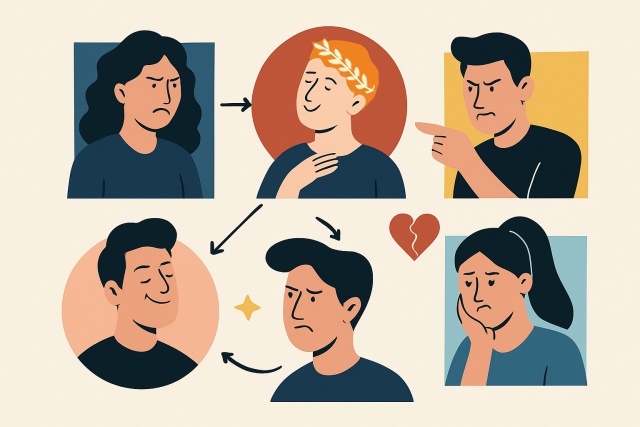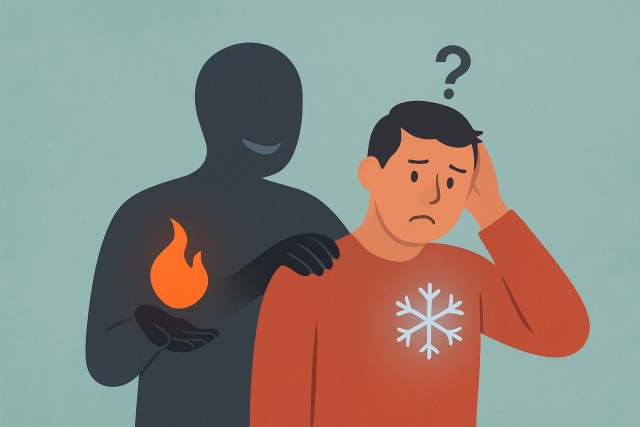
Recognizing Different Types of Narcissists And Their Traits
Narcissism comes in various forms, from overt arrogance to hidden insecurity. This guide breaks down...
Figuring out if their apologies come from the heart or are just tactics can be a real headache, especially when you are trying to understand how and why do narcissists apologize.
Narcissism is about people who have an inflated sense of their importance and constantly fish for admiration. They often struggle to connect with others emotionally. While people use the term casually in daily conversations, Narcissistic Personality Disorder (NPD) is more serious. It is a clinical condition defined by persistent grandiosity, a heightened sense of entitlement, and emotional coldness that can strain personal relationships.
An apology is more than just tossing out a few words. It’s about someone truly realizing they’ve caused hurt and feeling genuine regret deep down. They then step up to make amends. This kind of honesty helps mend fences by acknowledging the other person’s feelings and owning up to what went wrong.
Genuine apologies often lay the groundwork for strong relationships. They do more than just smooth things over—they help build trust and nudge us toward owning up to our mistakes. They also open the door for honest communication and forgiveness.
Narcissists might throw out apologies now and then but since real empathy isn’t exactly their strong suit, those apologies rarely carry genuine remorse. More often than not, these statements come off as just surface-level smoke and mirrors—aimed at managing how others perceive them or clawing back some control.
"Narcissistic apologies usually revolve more around saving face than actually mending the relationship. They tend to serve the person's own agenda rather than coming from a place of genuine remorse, which, in my experience, can leave the other person feeling pretty baffled and, frankly, a bit invisible." - Dr. Lisa Firestone, Clinical Psychologist
Telling the difference between a manipulative narcissistic apology and a sincere one usually boils down to their choice of words and body language. It also depends on whether their actions actually match up over time. Genuine apologies tend to be specific and carry real emotion. Manipulative ones often come across as rehearsed or defensive.
| Factor | Genuine Apology | Narcissistic Apology |
|---|---|---|
| Acknowledgement of Fault | Candidly admits to specific mistakes without beating around the bush | Vaguely admits fault or dodges taking real ownership |
| Presence of Remorse | Shares heartfelt regret that you can almost feel | Comes across as hollow or lacking genuine emotion |
| Responsibility Acceptance | Owns up fully, no ifs, ands, or buts | Shifts blame onto others or downplays what really happened |
| Commitment to Change | Lays out clear, practical steps to make things right | Throws out empty promises that sound more like lip service |
| Impact on Behavior | Leads to meaningful, lasting positive changes you can count on | Keeps up harmful behavior without putting in real effort to improve |
Take a narcissist for instance. They might say something like "I am sorry if you felt hurt" which shifts the spotlight from their actions to the other person's feelings. It is a classic move. Often they start with an apology that sounds sincere but before you know it the blame lands elsewhere or the same hurtful behavior makes a comeback.
Narcissists have a knack for using apologies as a slick trick to sidestep responsibility and keep everyone dancing to their tune. Instead of genuinely feeling sorry their so-called apologies usually come off as schemes designed to win back trust and hush up any criticism. They leave their victims scratching their heads.
Manipulative apologies have a sneaky way of slowly wearing down your emotional well-being and chipping away at trust. They also put a serious strain on attachment bonds.
If you ever catch yourself trapped in that frustrating loop where apologies roll out fast but the hurtful behavior keeps popping back up leaving you worn out or confused, those are clear red flags that this apology dance is toxic. It’s important to spot emotional manipulation tactics like gaslighting, blame-shifting or having your feelings brushed aside—these are warning bells for your emotional well-being.
Dealing with narcissistic apologies requires protecting your emotional well-being by setting clear, unshakable boundaries and carefully sizing up just how sincere their words really are. Try not to get caught up in the emotional tug-of-war or let yourself be swayed by slick promises.
Deciding whether to reconcile or take a step back usually boils down to how the narcissist acts over time and, more importantly, how safe you feel emotionally. When you ask, do narcissists apologize with genuine intent, the answer is that true change is rare and demands real effort and owning up to past mistakes.

Narcissism comes in various forms, from overt arrogance to hidden insecurity. This guide breaks down...

Covert narcissists use bizarre, subtle tactics to manipulate and control. Learn how to spot these we...

Insecurities impact relationships quietly but deeply. Learn about common types, how they develop, an...

Discover the diverse types of relationships that influence our lives, from family and friendships to...